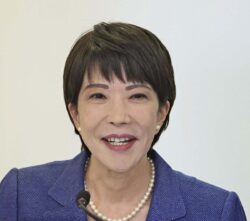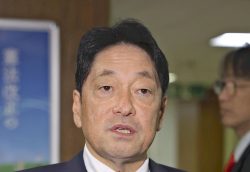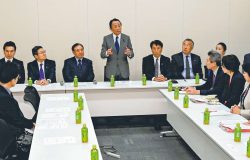Japan’s Ruling Party Decides to Reform its Factions; Groups to be Separated from Money and Personnel Affairs
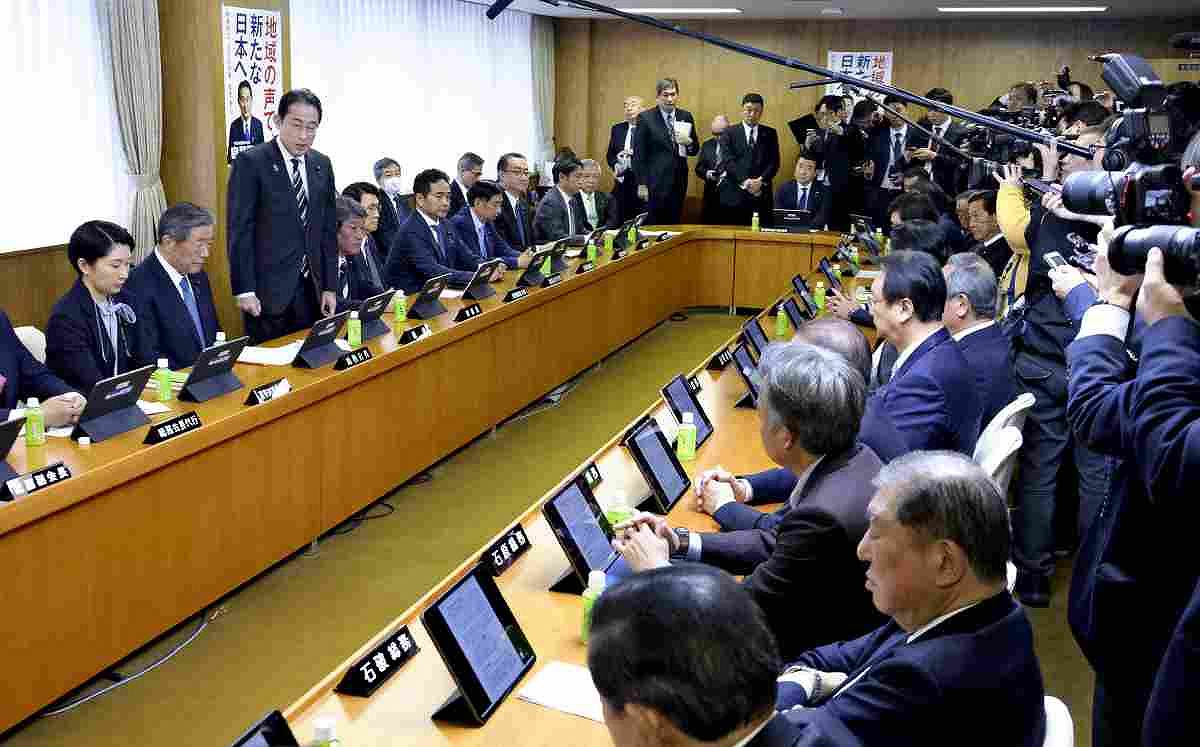
Prime Minister Fumio Kishida, third from left, speaks at the Liberal Democratic Party General Council meeting at LDP headquarters in Tokyo on Thursday.
18:15 JST, January 26, 2024
The Liberal Democratic Party on Thursday decided on an interim plan on political reform compiled by its political reform headquarters, which declares that the party’s factions must be transformed into true policy groups, completely breaking away from matters of money and personnel affairs.
The interim plan also refers to clarification of political responsibility over alleged violations of the Political Funds Control Law involving LDP factions, indicating that the party might pursue the responsibility of Abe faction executives and others who were not prosecuted over the latest issue.
“We must continue to make efforts to realize the interim plan,” said Prime Minister Fumio Kishida, who is also the LDP president and the head of the reform headquarters, at an extraordinary meeting of the LDP General Council that decided the interim plan. “There’s no end to political reform. There will be a difficult road ahead.”
Regarding factions, the interim plan states that “the situation has continued in which factions cannot avoid being seen as groups dealing in money and personnel matters,” declaring that the factions would depart from their traditional style.
Under the interim plan, the LDP prohibits its factions from holding political fundraising parties, providing funds to faction members in allowances known as summer “ice money” and winter “mochi money,” and recommending their members for cabinet and other posts.
Out of consideration for the Aso faction led by LDP Vice President Taro Aso and the Motegi faction led by Secretary General Toshimitsu Motegi, both of whom are against the idea of dissolving factions, the interim plan allows the factions to continue existing as policy groups.
In response to numerous voices in the reform headquarters calling for executives of the Abe faction — the largest faction, once led by former Prime Minister Shinzo Abe — to face political responsibility, the interim plan states that in addition to clear accountability for those involved, “a conclusion must be reached about what political responsibility should be.”
It also expresses the view that the fact that “the party has not responded responsibly to those involved” has aggravated the public’s distrust.
Some of the party’s executives believe that it is desirable for those involved to voluntarily decide to take personal action, such as leaving the party, before the party itself takes action.
"Politics" POPULAR ARTICLE
-

Japan to Support Central Asian Logistics Route That Bypasses Russia, Plan to Be Part of Upcoming Summit in Tokyo
-

Japan to Tighten Screening of Foreigners’ Residential Status by Providing Information of Nonpayment of Taxes
-

Chinese, Russian Bombers Flew Unusual Path by Heading Toward Tokyo; Move Likely Meant to Intimidate Japan
-
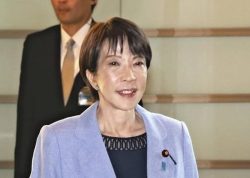
Japan Plans National Database to Track Foreign Ownership of Real Estate, Land as It Weighs New Rules
-

Up to 199,000 Deaths Estimated From Mega-Tsunami; Most Recent Occurrence Took Place in 17th Century
JN ACCESS RANKING
-

Keidanren Chairman Yoshinobu Tsutsui Visits Kashiwazaki-Kariwa Nuclear Power Plant; Inspects New Emergency Safety System
-

Tokyo Economic Security Forum to Hold Inaugural Meeting Amid Tense Global Environment
-

Imports of Rare Earths from China Facing Delays, May Be Caused by Deterioration of Japan-China Relations
-

University of Tokyo Professor Discusses Japanese Economic Security in Interview Ahead of Forum
-

Japan Pulls out of Vietnam Nuclear Project, Complicating Hanoi’s Power Plans



